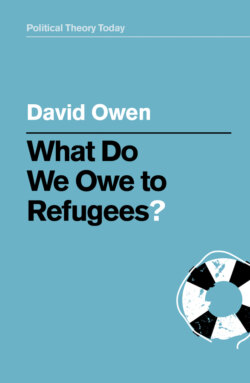Читать книгу What Do We Owe to Refugees? - David Owen - Страница 9
Introduction
ОглавлениеWe commit to a more equitable sharing of the burden and responsibility for hosting and supporting the world’s refugees.
New York Declaration for Refugees and Migrants (2016)
Today, as people flee civil wars, authoritarian states, persecution by state and non-state actors, famine and environmental disaster, the international refugee regime that was forged in the aftermath of global war and extended in the context of the independence struggles and post-independence conflicts of the second half of the twentieth century is creaking, perhaps cracking, under the strain. The images that we see, of overcrowded boats crossing the Mediterranean and drowned bodies washed up on Europe’s holidays beaches, or of caravans of displaced people trekking to the Mexican border with the United States – and the images that we generally don’t see, of people dying in desert crossings in Libya and Mexico, or of families warehoused in refugee camps across Africa and Asia1 – have led the UN secretary general to speak of a global crisis of solidarity. Many in need of protection do not receive it, and even those who reach camps (or urban spaces) often fail to find security.2
Acknowledgement of the failings of our current political framework for responding to refugee crises and the need for a renewed approach to refugee protection found expression in the United Nations’ 2016 New York Declaration for Refugees and Migrants, which highlighted the need for greater international cooperation and responsibility sharing.3 But what exactly is the nature of the responsibility that states owe to refugees? And what kinds of international cooperation are required? To raise these questions is to ask how we should approach refugee protection today. Who should count as a refugee and what is owed to persons with that status? Is it sufficient for the international community to provide funds to meet the basic humanitarian needs of refugees in the (typically neighbouring) states of immediate refuge? What weight should be given to the refugees’ own choices – exhibited, for example, in embarking on dangerous journeys to Europe or the United States? Under what conditions can refugees be repatriated to their own states? These are among the most pressing ethical questions in contemporary politics and it is the task of this book to provide a framework for addressing them.
One pragmatic response to these questions can be found in the Global Compact on Refugees, a nonbinding agreement that the New York Declaration tasked the United Nations High Commissioner for Refugees (UNHCR) with drafting.4 Its objectives are to ease pressures on host countries and to expand access to the resettlement of refugees in other states, as well as to enhance refugee self-reliance and support conditions in countries of origin for the safe return of refugees. The adoption of this compact is a significant diplomatic achievement, although the challenge of securing the voluntary cooperation among the relevant actors that is required for implementing the compact will be considerably more demanding. But, if we are to evaluate responses to the contemporary predicaments of refugee protection, we need to step back from our immediate political context and engage in a deeper investigation of the institution of refugeehood.
Such a project is necessary not simply because the established refugee regime is under strain as a result of failures of international cooperation. One reason why it is necessary is, more fundamentally, that the figure of the refugee in contemporary politics (as well as in academic literature) is caught between two distinct and incompatible pictures of refugeehood – humanitarian and political – that give rise to rather different accounts of who is entitled to refugee status, of the obligations owed to refugees, and of the appropriate international organisation of refugee protection.
